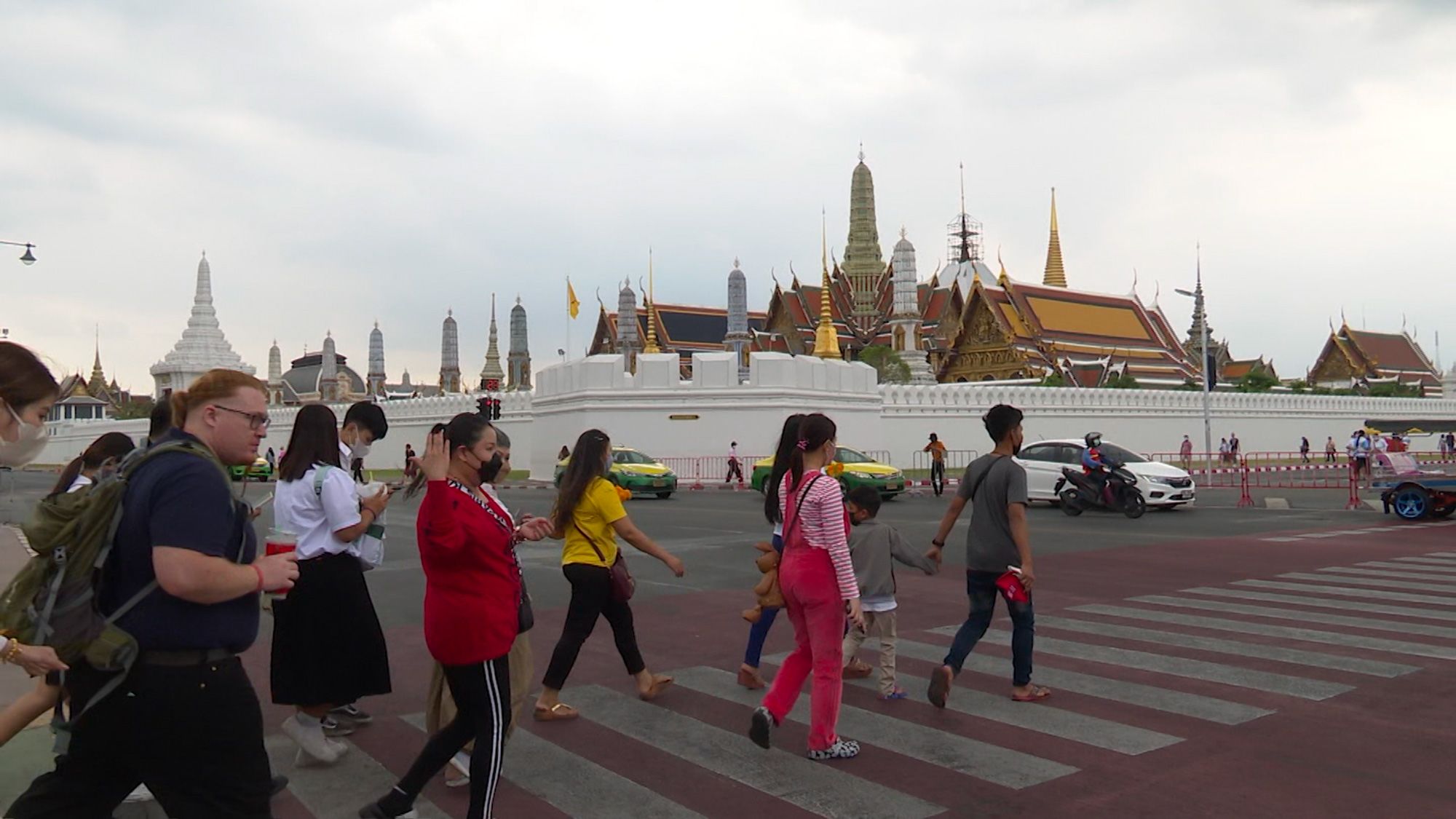Thailand’s Tourism Soars as Millions of Chinese Tourists Flock to Golden Shores

Thailand’s Tourism Soars as Millions of Chinese Tourists Flock to Golden Shores
In a remarkable turn of events, Thailand is experiencing an unprecedented influx of Chinese tourists as the nation’s stunning beaches, bustling shopping districts, and enchanting temples once again become bustling hubs of activity. The driving force behind this remarkable resurgence is a newfound commitment to resuscitating Thailand’s economy, spearheaded by the newly appointed Prime Minister Srettha Thavisin. This revival hinges on a visionary visa-free policy, which, as of September 25th, welcomes Chinese and Kazakh tourists with open arms and no visa requirements until February 24th of the following year. This bold move underscores the pivotal importance of the tourism industry’s recovery in Thailand.
The timing of this policy could not have been more perfect, as it coincides with China’s renowned “Golden Week” holiday season, an annual celebration that revolves around National Day on October 1st. This year’s Golden Week has an added layer of significance, as it aligns with the Mid-Autumn Festival, extending the travel festivities from September 29th to October 8th. Importantly, this marks one of the first major holiday seasons since the peak of the Covid-19 pandemic during which Chinese travelers can explore foreign shores with unparalleled freedom.
The momentous policy shift was officially launched at Bangkok’s Suvarnabhumi Airport, where Chinese visitors arriving from Shanghai received warm greetings and gifts from Prime Minister Srettha and tourism ministers. Their welcoming smiles and generosity mirrored Thailand’s eagerness to embrace its role as a premier destination once more. Prime Minister Srettha expressed his optimism, stating confidently that this visa-free scheme would serve as a catalyst for substantial economic growth in the country.

Thailand’s Road to Recovery
Thailand, known as the “Land of Smiles,” has faced the brunt of the Covid-19 pandemic’s impact on the global tourism industry. The nation heavily relies on tourism as a pillar of its economy, and the sudden halt in international travel sent shockwaves through the country’s finances. The pandemic prompted the Thai government to implement strict measures to curb the virus’s spread, including closing its borders to international tourists. These necessary actions were a bitter pill to swallow, given that tourism contributes significantly to the nation’s GDP.
However, as vaccination efforts have ramped up globally and countries have gradually reopened their borders, Thailand has been quick to adapt to the changing landscape. The country’s leaders recognize that reviving tourism is paramount to economic rejuvenation, and the visa-free policy for Chinese and Kazakh tourists is a pivotal part of their strategy.
The Significance of Chinese Tourists
China, with its burgeoning middle class and a growing appetite for international travel, has become a cornerstone of the global tourism industry. Thai authorities understand that attracting Chinese tourists is essential to their recovery efforts, given that China is one of the largest sources of international travelers in the world.
The visa-free policy not only simplifies the travel process for Chinese visitors but also serves as a powerful incentive. It eliminates the need for cumbersome visa applications, streamlining the journey from China to Thailand. This newfound convenience has undoubtedly contributed to the surge in Chinese tourists flocking to Thai destinations.

The Economic Boost
The decision to open the doors to Chinese and Kazakh tourists could not have come at a more opportune time. Thailand’s economy has been grappling with the far-reaching consequences of the pandemic, and this policy is a shot in the arm that promises substantial economic gains.
The tourism industry in Thailand is a multifaceted powerhouse. It provides employment opportunities across various sectors, from hospitality and transportation to food and retail. As Chinese tourists flock to Thailand, these sectors are experiencing a resurgence in demand, resulting in job creation and income generation for the Thai population.
The economic benefits extend beyond immediate employment gains. Increased tourist spending has a cascading effect, boosting related industries such as agriculture, manufacturing, and services. Furthermore, the influx of foreign currency from tourism bolsters Thailand’s foreign exchange reserves, contributing to the country’s overall economic stability.
Tourism-Friendly Initiatives
While the visa-free policy for Chinese and Kazakh tourists is the headline-grabbing initiative, it is not the only effort Thailand is undertaking to revitalize its tourism sector.
1. Health and Safety Protocols: The Thai government is acutely aware of the importance of maintaining stringent health and safety measures to ensure the well-being of both tourists and locals. Stringent testing, contact tracing, and vaccination campaigns continue to be a priority.
2. Promotion of Local Tourism: In addition to international tourism, the Thai government is actively promoting domestic tourism. This strategy seeks to engage the local population in exploring their own country’s attractions, reducing reliance on international tourists during uncertain times.
3. Environmental Sustainability: Thailand recognizes the significance of preserving its natural beauty and cultural heritage. Initiatives for sustainable tourism, such as responsible wildlife encounters and eco-friendly practices, are being promoted to ensure the long-term vitality of the industry.
4. Digital Transformation: To enhance the overall tourist experience, Thailand is investing in digital solutions. This includes mobile apps for easy navigation, contactless payment options, and virtual tours to cater to tech-savvy travelers.
The Global Impact
Thailand’s remarkable rebound in tourism is not just a story of national revival; it is a beacon of hope for the global tourism industry. As countries worldwide grapple with the complex task of reopening their borders safely, Thailand’s success in attracting visitors offers valuable insights and inspiration.
It highlights the importance of adaptability, innovation, and collaboration between the public and private sectors. Thailand’s visa-free policy demonstrates that governments can play a pivotal role in reigniting tourism by creating a welcoming environment for travelers.
Moreover, it underscores the resilience of the travel industry. Despite the challenges posed by the pandemic, the allure of exploring new cultures, experiencing breathtaking landscapes, and forging connections with people from around the world remains as strong as ever.

Conclusion
Thailand’s journey to recovery is not without its hurdles, and the uncertainties brought about by the ongoing pandemic continue to cast a shadow. However, the nation’s bold step in welcoming Chinese and Kazakh tourists with open arms is a testament to its unwavering commitment to revitalizing its economy and reclaiming its status as a global tourism hotspot.
As millions of Chinese tourists once again embrace Thailand’s golden shores, they bring with them not only their enthusiasm for travel but also the promise of economic resurgence. This remarkable turnaround serves as a beacon of hope for nations worldwide, demonstrating that with determination, adaptability, and the right policies, the world can rediscover the joy of exploration and the economic benefits of a thriving tourism industry. Thailand’s remarkable journey from crisis to recovery is a testament to the indomitable human spirit and the enduring allure of travel.



